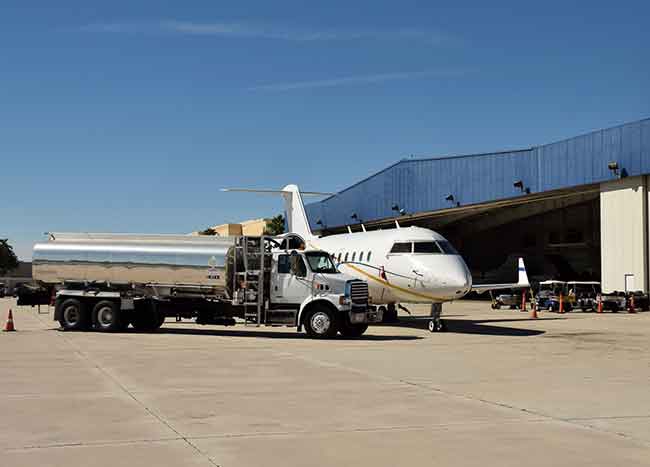
News
On Final: FBOs and fuel spills – not so fine
Over the past three decades, the environment has become an issue of major concern worldwide. Canada has a relatively long history of regulating environmental matters, including spills of toxic substances. For FBOs providing fuel service, having a basic working knowledge of environmental regulations applicable to fuel spills can save time and money, and prevent big headaches.
September 4, 2015 By Amanda Winters
 Punishment for failing to report a spill can include a fine of up to $200 Over the past three decades
Punishment for failing to report a spill can include a fine of up to $200 Over the past three decadesFor the purpose of our overview, consider the following example. You are Fred Fine, the owner and manager of Fine Fuel Ltd., a fuel provider at the Vancouver International Airport. An employee reports to you that one of your large fuel tanks appears to be leaking. The tank is situated close to the water line of the nearby Fraser River, which empties into the Pacific Ocean. It is unclear how long the tank has been leaking.
First, which level of government should Mr. Fine look to when dealing with a spill? Most areas of law in Canada are expressly covered by our Constitution, which designates which level of government has jurisdiction to regulate that area. However, unlike aeronautics (under Federal jurisdiction), or matters such as health care and property rights (under Provincial jurisdiction), either level of government can write laws about the environment. And, in fact, both levels of government do have environmental laws covering matters such as assessments, water pollution, and waste management. Typically, the laws complement each other. However, in the event of a conflict, where it becomes impossible to comply with both the federal and provincial law, the federal environmental law will be paramount.
Second, is a fuel spill something that Mr. Fine needs to report? Both the Canadian Environmental Protection Act (CEPA) and B.C.’s Environmental Management Act (EMA) define what types of substances are harmful to the environment. If the substance might have long-term harmful effects on the environment, or if it is a danger to human health, it is likely a hazardous substance under these Acts.
While CEPA makes reporting a spill voluntary (section 16), the reporting a spill is mandatory under the EMA (section 79). But wait, is this a conflict? It is not. Mr. Fine can still comply with the voluntary reporting provision in CEPA by obeying the mandatory reporting provision in the EMA.
Third, who does Mr. Fine report the spill to? In British Columbia, the Spill Reporting Regulation, sets out the steps to follow when reporting a spill, right down to the telephone number to call. Some provinces and territories have similar regulations. Each province’s ministry of environment, or equivalent ministry, can provide information about how to report, and to whom.
Fourth, what happens after the spill is reported? A government-appointed director has the discretion, pursuant to the EMA’s provisions, to undertake a range of activities on behalf of the B.C. government in response to a spill, from simply assessing the hazard, to fully restoring a polluted wildlife habitat (section 80). The director can also require Mr. Fine, either as a property owner, or as the party who has control of the property where the spill occurred, to take various steps at his own expense (section 83). This can include providing the director with information, investigating the effects of the pollution, taking steps to stop the pollution, or taking remedial measures to clean-up the pollution.
Finally, what are the consequences for Mr. Fine and Fine Fuels if the requirements in the EMA are not followed? Considering how costly it can be to remediate a spill, Mr. Fine may decide not to report it. Or perhaps he reports it, but does not carry out all the activities imposed by the director.
The legal penalties imposed on Mr. Fine or Fine Fuels in B.C. are no small matter. They could be slapped with an administrative penalty, which is a monetary fine (section 115). Failing to report a spill could cost up to $40,000. The same penalty applies if Mr. Fine or Fine Fuels fails to comply with an order from the director. In other words, if Mr. Fine neglects to provide information, or does not remediate the spill, he and his company may pay for it. Mr. Fine and Fine Fuels could also be charged with an offence (section 120). Punishment for failing to report a spill can include a fine of up to $200,000, and six months imprisonment.
While our hypothetical Mr. Fine dealt with a B.C. environmental regulation scheme, there are similar schemes across Canada. Understanding your obligations in the event of a spill is the first step in not only minimizing the impact of a spill, but also in preventing spills in the first place.
Amanda Winters is an associate lawyer in the Aviation Practice Group at Alexander Holburn Beaudin + Lang LLP. The Aviation Practice Group handles legal matters of special concern to the aviation community across Canada and internationally. For more information, go to www.airlawblog.com.